
The pandemic: did we cover it well?
It is now almost exactly 18 months since the coronavirus burst into our lives to dominate everything we do in a way that most of us have never experienced before. By “our” and “us”, I mean both as individuals and as journalists. I remember science editors years ago offering stories about pandemic planning and seemingly alarmist scenarios, always referencing the Spanish flu of a century ago. But I never took them seriously. Did anyone?
And when the BBC (well ahead of the Press) kept harping on about Wuhan, I thought “but thousands die of flu every year; why is this such a big deal?” I’d worked for an editor who was obsessed with China and with health scares. He’d gone bonkers over bird flu and Sars – I remember writing a rather excellent headline about busloads of people being taken to be quarantined in a grand country pile (she says modestly) – and they’d come to nothing. Who was to say this coronavirus would be so different?
Quite a lot of people, actually. People who knew a lot more than I – or most journalists and certainly Boris Johnson – did. And they were right. So, on this sort-of anniversary, I’ve been musing about the impact of the coronavirus on our print journalism. Not financially, but about the way the story has been covered and also about what has fallen by the wayside.
Who was to say this coronavirus would be so different? Quite a lot of people, actually.
What happened to proper journalism?
For I have come to think that a big rolling news story like this has a detrimental effect on the quality of our journalism. Everyone is suffering from plague fatigue, to the extent that we don’t seem able to summon the energy to do proper journalism on that – or anything else.
Looking back at the early coverage, there were dramatic stories about 600,000 people dying, about one in ten needing to go to hospital, about half of workers being off sick, but these were all “worst-case scenarios” and the journalists writing the figures clearly didn’t believe them – that 600,000 figure didn’t even feature until the turn of the Sunday Telegraph splash. The headline on that story, from February 16 last year, was “Millions to be told ‘stay at home’ if virus spreads”. It seemed an incredible notion.
There’s nothing Fleet Street likes better than a scare story, so there was quite an appetite in the middle of February, but still room for something else – like Brexit or Megxit, booming Britain and booming house prices, mansion taxes and civil service reforms. By the 25th, though, it had pretty well taken over and the only thing that was going to stop the flow was the belated emergence from holiday of the prime minister to announce his engagement and his fiancée’s pregnancy.
In retrospect, the Telegraph had it all, from “coronavirus pandemic alert” to “major events in doubt” via quarantine and mass testing. It’s just that it took rather more than the four days those headlines spanned for it all to come about. In those early days, there was plenty of meat, new information, biology and jargon to explain, experts to opine on what might happen, discussion of strategies and the way life might be disrupted. It was all so strange, there was so much to take in. Of course, for our newspapers, there was no other game in town.
Right – Left – Centre
I have looked at a handful of them – the Telegraph and Express from the Right, the Guardian and Mirror from the Left, and the Times and i as being roughly in the centre (albeit centre-right and centre-left) – to see what they have been doing with their front pages since then.
Of the dailies, only the Express splashed on anything other than Covid in all of March, April and May of last year (“New laws to protect access to your cash” in March; “Hancock to fix social care crisis” in April and “New national monument to honour our heroes” in May). Indeed, throughout the pandemic, this has been the paper most likely to lead on something else – the ratio of virus to non-virus stories being about 1.7 to 1. The Guardian and Mirror were the next most diverse, with a ratio of 2:1, while the Times and Telegraph have run three Covid stories for every splash on another subject; and the i has been the most obsessed with a ratio of 4 to 1. There have been four months when every i splash has been on the virus and one when there was a solitary non-Covid lead: the expulsion of Jeremy Corbyn from Labour in October.
With so many acres of newsprint (without even thinking about the pages upon pages inside) devoted to a single issue, you might think that every avenue has been explored, every angle dissected. Sadly – and this is where my concerns about what the pandemic has done to our journalism spark from – this is far from the case. The novelty soon wore off and once Johnson was back in his office, what was newsworthy ceased to be decided in editorial conferences, but in Downing Street. There were exceptions: the concerns over PPE being a notable one. The Mail (not part of this exercise) was an early voice of concern about what was going on in care homes. But for the Telegraph, Times and Express, the news of the day almost always came from government briefings – whether from the panelled room in full view or from “guidance” dispensed in the back office.
Resorting to boosterism

Boosterism took over: we are prepared; we will turn the tide; we will defeat the virus; we are world-beating. Once the lockdowns started, the coverage was almost all about when they would end, when we could go on holiday, how much cash was being splashed on furloughed workers (though not on contracts for mates). Then there were vaccines that would save us all. If there were spanners in the works, they were rebel Tory MPs. After the first Briton died until the death toll passed 100,000, not one of those four papers led on the terrifying and accelerating loss of life. Questions about procurement processes or the setting up, leadership and cost of the test and trace programme were almost non-existent. It was as though editors had decided that all people cared about was when they could get back to normal – hence the focus on holiday traffic lights and what might happen tomorrow, rather than what actually happened yesterday.
The Guardian and Mirror were naturally more sceptical and it was, of course, they who exposed Dominic Cummings’s jaunt to Barnard Castle. They wanted more than a round of applause for health workers; they were more interested in the ethnic and societal inequality exemplified by those who were killed by the virus. But they were also more willing to say, “there’s another more important story today”.
Questions about procurement processes or the setting up, leadership and cost of the test and trace programme were almost non-existent.
So which stories did break through across the board? This is probably the most depressing aspect of the past 18 months. Essentially, there were just seven:
- Brexit, obviously, with the trade negotiations, the Christmas Eve deal and the fallout since;
- Royals – Harry and Meghan, the death of the Duke of Edinburgh;
- Sport – the Super League threat, the Euros and the Olympics;
- The US Presidency – the election, the storming of the Capitol and the inauguration;
- Racism – the Government’s race report, the BLM protests and the planned legislation to outlaw such demos;
- Sarah Everard and Madeleine McCann, and
- Jeremy Corbyn.
And four of those boiled down to jingoism – either us being better than everyone else or everyone else being horrid to us.
There have, of course, been other stories. But these were the only issues that garnered sustained coverage across a range of titles. It seems a pretty narrow perspective of the world we are living in.
Climate change: half-hearted coverage
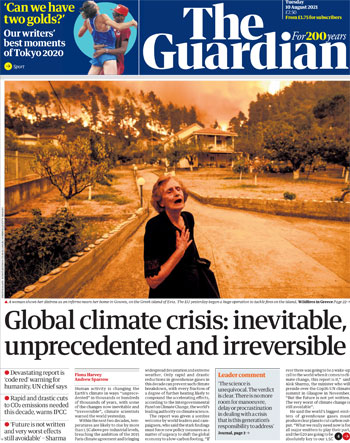
One subject that has struggled to break through the pandemic ring of steel is the biggest running story of them all: climate change. In the past year, it has had a front-page presence on barely 30 occasions. And just two titles accounted for two-thirds of those appearances: The Guardian – as you might expect – and The Times – which you might not, given its proprietor’s renowned climate scepticism.
The Times has created a label called Times Earth and produced spreads and supplements on “20 ways to save the planet”, and the Express launched a “Green Britain revolution”, but, apart from the Guardian, it doesn’t feel as though anyone’s heart is really in it. Most of the stories that make the front pages are about the cost to us – whether in higher fuel bills, higher taxes or just inconvenience – and few made the connection between global warming and the recent flooding here.
The extreme heat and fires in America and Canada last month were page one news only for the Guardian. The Times and FT joined them in putting the German floods on the front, but the Telegraph preferred a Guardsman with a bugle. The limited interest in that story was truly extraordinary, given the large death toll and the fact that this was happening only just across the road from us, as it were. Yet most saw it as a freak weather story rather than a symptom of a far greater malaise.
This week, however, we were given the clearest, starkest warning with the UN’s “code red” report. The Guardian, which had led on the preview on Monday, the i and Metro almost filled their fronts with it, and it was even the splash for the Express. The Mail and Mirror put big Greek fire pictures across the top half of the page, while the Times and Telegraph both gave it second billing after A levels. It was nowhere to be seen on the Star or Sun fronts.
Yet most saw it as a freak weather story rather than a symptom of a far greater malaise.
It’s all about us
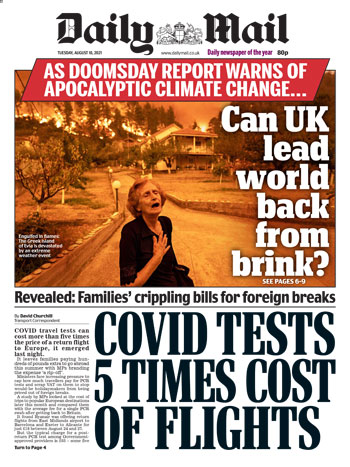
Two things struck me about this coverage. The first was the whitetops’ approach. The Express headline was “PM: Wake up to red alert on climate crisis”, the Mail’s “Can UK lead world back from the brink?” Is it really necessary to fly a Union flag on every story to make readers care? It wasn’t enough for the Express to report what the UN had to say; it had to report what Boris Johnson had to say about what the UN had to say, while for the Mail, we had to be leading the world.
Both papers ran pictures of the devastating Greek fire, noting that these had been raging for a week – though neither had mentioned them until the day before. Then, again, the story had been wearing a Union flag. “British crews fighting Greek wildfires” proclaimed the Express, while the Mail used the picture to illustrate its UN report prelim, justifying its presence in a couple of sentences at the end, one of which pointed out that fire crews from London, Merseyside, Lancashire, Wales and the West Midlands had flown out to help. You might imagine that someone in Derry Street might have thought that if five brigades had sent out teams to southern Europe, the fires they were tackling might be quite a big deal and worth more than a postcard pic and a 50 words.
Still giving space to deniers
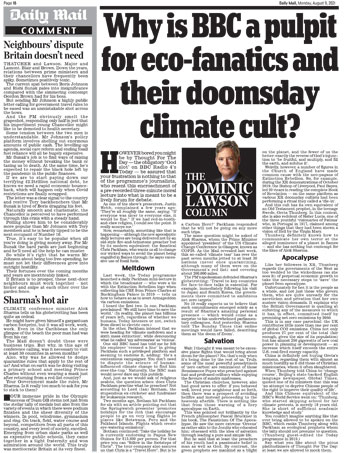
Meanwhile the oped on the next page was given over to Dominic Lawson for a bit of climate denial. Under the headline “Why is BBC a pulpit for eco-fanatics and their doomsday climate cult?” Lawson railed against being lectured by “the fanatical” Chris Packham on Radio 4 on what we can do to save the world. “In reality,” he wrote, “the planet has billions of years left, regardless of whether we humans, Today listeners or not, switch from diesel to electric cars.”
The BBC knows to its cost the perils of allowing Mr Lawson to express such views unchallenged in the face of scientific evidence. And in today’s climate (no pun intended), I find it amazing that any newspaper, however eager to bash the Beeb, should print such an assertion. Especially in the light of the report on the previous page.
But maybe the post-Dacre Mail is still in denial, too. It has campaigned commendably against throwaway plastic bags, but I think that is more about protecting swans than the planet. Similarly, it has been on Alok Sharma’s case this week for his globe-trotting in advance of the COP26 summit in November. The minister with responsibility for the gathering is under fire not, however, for his carbon footprint, but for visiting “red list” countries without quarantining.
Ah yes, COP26. Climate sceptics our Press may be, but you can bet that once that conference gets going, it’ll be Union flags and Britain “showing the world” all the way.
Generation gap
The second thing that struck me when looking at the UN report coverage was that newspapers really are as doomed as the planet – and they know it. There was a time when they would be constantly looking to the next generation of readers, but now they just don’t bother; they play only to their own gallery; their existing, ageing audience with its existing, ageing prejudices and foibles. They occasionally try to be “hip”, like uncle embarrassing everyone at the family wedding, but mostly they stick with what they know – or think they know.
For anyone under 30 – and an awful lot of people who won’t see their 40s again – the most pressing issue in the world is climate change. People are changing their eating habits, their travelling habits, their purchasing habits. They really care. But most newspapers don’t. They pay lip service to the need to tackle global warming, but they have little conviction. They are dismissive of the one issue that might bring in younger readers – and are thereby admitting, as far as their own existence is concerned, that it’s a lost cause.
People are changing their eating habits, their travelling habits, their purchasing habits. They really care. But most newspapers don’t.
The inside track?
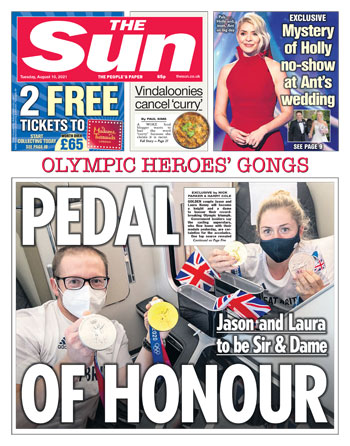
We can’t just savour the moment, can we? We always have to be looking for more, for the next thing; like binge-watching box sets instead of taking them one episode at a time, week by week, or even night by night.
And so it was with the Kennys’ Olympic triumphs last week when Laura won her fifth gold to become Britain’s most successful female competitor, while husband Jason became the country’s top Olympian of all time after collecting his ninth medal – seven of them gold.
Laura’s picture made most of the Saturday front pages and The Times kicked off its Olympic spread with the intro: “The British cyclist Laura Kenny is set to be named a dame in the New Year’s Honours.” This nugget came courtesy of “Whitehall insiders” who were “sure” she would be honoured.
The Express went a step further on Monday, after the couple had joined the last of their teammates in returning home from Tokyo, with a splash instructing whomever it may concern: “Honour heroes who lifted nation”. There were “calls”, it reported, for all 65 medallists to be rewarded with gongs (excuse me, but medals and gongs are synonymous and the fact that they are medallists means they have, er, already been rewarded with gongs – but the Express wants more).
Who was making these calls? Well, no one. Tory MP Michael Fabricant said he was sure the athletes would be “awarded” for their achievements. “I’m sure Boris and his team are already thinking about it”. You bet they are! Another Tory MP thought it would be good if those who had helped the athletes “to deliver” were also recognised. There were quoted people saying Kenny should be knighted, but nobody actually said all 65 medallists should be honoured.
Roll on to Tuesday and the Sun catches up with its stablemate to produce a splash headlined “Pedal of honour”. Jason would be knighted; Laura would be made a dame. This time it was “government insiders” who were sharing this unimagined insight. “One top source” said, “I think you can expect Team GB’s golden couple to be showered with gongs next.” Because Whitehall mandarins are renowned for talking about “golden couples” and the “showering” of “gongs”.
As night (or knight) follows day, great British achievements in the sporting arena are recognised in the honours lists. Kelly Holmes became a dame the year after winning two golds in 2004 and Matthew Pinsent’s CBE was upgraded to a knighthood in the same list after he collected his fourth gold at the Athens games. Steve Redgrave had been knighted in 2001, having won his 5th gold in Sydney the year before. Chris Hoy was knighted in 2009 after picking up three golds in Beijing.
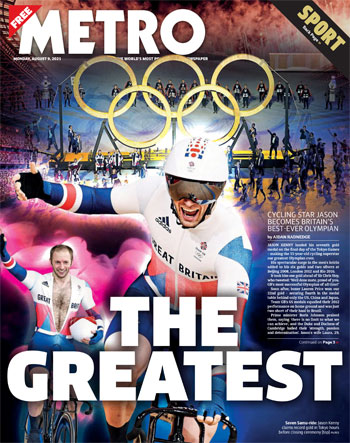
I am not a Tory MP “calling” for anything or a Whitehall insider with my finger on a secret magic pulse, but I think I can say with confidence that, barring a revolution, Mr and Mrs Kenny will feature at the top of the next honours list.
I didn’t need the Sun, the Express, the Times – or any other newspaper or broadcaster – to tell me this. It’s not news.
The Metro editorial team seem not to have those “insiders” in their contacts books, so there was no gong speculation in its coverage of Jason Kenny’s final triumph. Instead, they focused on producing the best-looking front page of the Games.
I didn’t need the Sun, the Express, the Times – or any other newspaper or broadcaster – to tell me this. It’s not news.
Stanley Johnson: a man with many hats
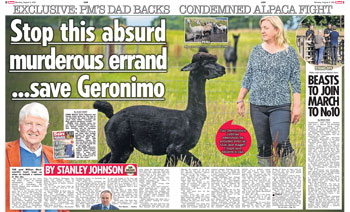
Even with a pandemic and climate change and Euros and Olympics, we can still depend on an appealing animal under death sentence to provide some silly season light relief. This year, the task falls to Geronimo the alpaca, who has tested positive for TB. Or not. Depending on whether you believe the environment secretary or its owner and vet. The High Court has ordered that he be destroyed, but as I write, he is clinging on.
Among those in his corner is the multi-talented Stanley Johnson, who is bylined in the Sun as its “wildlife reporter”. Who knew? Certainly not a former executive of that paper, who got in touch to demand to know when that alleged wife-beater had been commissioned.
That prompted a little diversionary research. Johnson Père made his first appearance in the paper (that I can find) in July 2010, writing about elephants. Then he was bylined “Environmentalist, author and father of London mayor Boris”. He reappeared in 2015, first in July, tagged “Environmentalist, animal welfare campaigner and former MEP” and then in September as “Author, environmentalist and former MEP”. Two weeks later he was given an RSPB award, prompting a story, headlined “Gong for Sun man”, in which he was described as the paper’s wildlife reporter. This was the first Sun readers will have known of it.
Stanley’s next appearance as an expert witness came in a news story in 2017 in which he was described as “Boris’s dad and ex-MEP” – perhaps Tom Newton Dunn hadn’t seen the memo – and for his next contribution he was “author, animal lover and Boris’s dad”. By 2018, he was back on track with the title “Sun wildlife reporter” and “Sun wildlife correspondent” under his byline, but when he wrote a whole oped last year he was merely a “conservationist”.
Now, with Geronimo’s life in the balance, he is back to being “Sun wildlife reporter and Boris’s dad”.
A man of many talents? You might think so, since he also appeared as a talking head on Newsnight this week to give his thoughts on the UN climate report.
I can’t say I share the view. There must be more knowledgeable people to write for the Sun or speak on the BBC on these issues – even if their surname isn’t Johnson.
Last word: I wonder if Rachel sends messages to Nigella discussing which of them has the more embarrassing brother / father?
There must be more knowledgeable people to write for the Sun or speak on the BBC on these issues.
Liz Gerard’s Notebook is a fortnightly column published in the InPubWeekly newsletter. To be added to the mailing list, enter your email address here.












